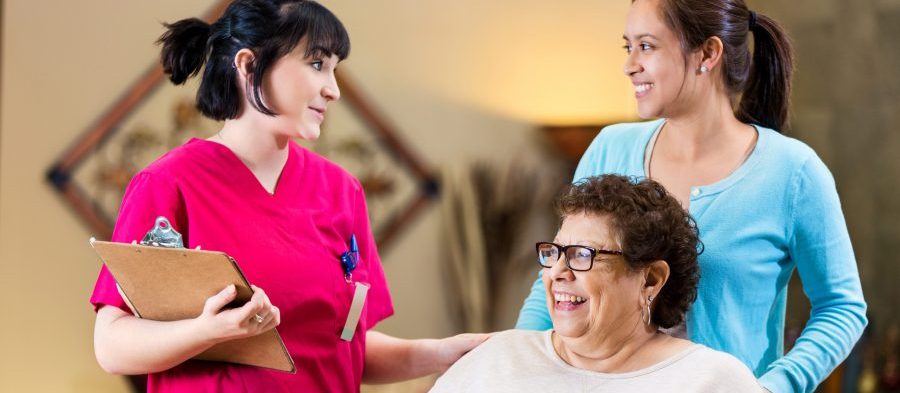A trip to the hospital, especially if it is unexpected, can be overwhelming for you and your family. As you and your medical team focus on your treatment while in the hospital, you may not be thinking about what happens when it’s time to go home.

However, your transition out of the hospital is crucial for a good recovery and can even reduce your chances of future hospital stays. When planning for your discharge, there are some key questions to address to clear up any confusion about your care and ensure a safe, successful transition. Use our hospital discharge checklist below.
Hospital Discharge Checklist
Here are ten important things to consider when preparing for a hospital discharge:
1.Safety – Is your home a safe place for your recovery?
Think about any stairs, steps, or other mobility challenges inside your home and create a plan for how you will deal with them. Will friends or family be there to assist you? If not, consider hiring a professional caregiver – whether for a few hours a week or every day – to help you with a safe and comfortable recovery.
2. Transportation – How will you get home from the hospital?
Plan your transportation home before it’s time to leave. Ask for a ride from a family member, friend, or caregiver who can drive you, or talk to the hospital staff about arranging a taxi. It is also important to think about how you will get to doctor’s appointments and other activities once you get home.
3. Food – Do you have food and other necessities at home?
While you’re recovering, doing errands may be especially difficult. If your refrigerator is not currently stocked, ask if a friend or family member could bring what you need to the house before you arrive. Consider your meals for the first week or two of your recovery and plan who will help you with shopping or meal preparation.
4. Medication – Do you have all the medications you’ll need?
Has there has been any change in your medications during your hospitalization? Be clear on your medication schedule and dosage before you head home, and make sure you have what you need. If you are unable to visit the pharmacy, ask the hospital to discharge you with all your medications.
5. Doctor’s Appointments – What is your follow-up care?
Talk to your doctor about the next steps in your medical care. Ask if and when you need a follow up appointment and with which doctor. Be sure to write down the important information, or ask a loved one to take notes on your behalf.
6. Home Health Care – Are you eligible?
Home Health Care includes skilled nursing, physical therapy and other related medical services you can receive at home. Discuss with your hospital team whether you are eligible for Home Health Care – if you are, it can be reimbursed through Medicare. A doctor must make the referral so be sure to ask them to refer you while you are still in the hospital.
7. Equipment – Do you need any medical equipment at home?
Will you need a commode, a shower chair, a walker? If so, discuss your needs with the hospital and ask them to arrange for you to leave with any necessary equipment.
8. Daily Routines – What changes or adjustments will you need to make?
Make sure you are clear on post-hospitalization instructions such as medication changes, dietary restrictions, or activities you should avoid. In addition, take note of any activities you need to add to your daily routines such as exercises, physical therapy or other post-hospitalization care.
9. Household chores – Will you need help with cooking, cleaning, or laundry?
Managing a household after a hospitalization can be especially difficult. Especially if you live alone, bringing in temporary home care can take stress off you. Seniors At Home caregivers can help with meal preparation, personal care, housekeeping, and transportation.
10. Care Management – Will you need assistance managing your care?
A hospitalization can be disorienting and it is common to require some help managing all your care needs while you get back on your feet. A professional care manager can take the stress off of you and your loved ones by helping you plan and get to doctor’s appointments, helping you navigate insurance and healthcare decisions, and communicating with your family and medical team.
To learn more about how caregivers and care managers can help with a personalized hospital discharge checklist, call Seniors At Home on 415-449-3700 or contact us online.